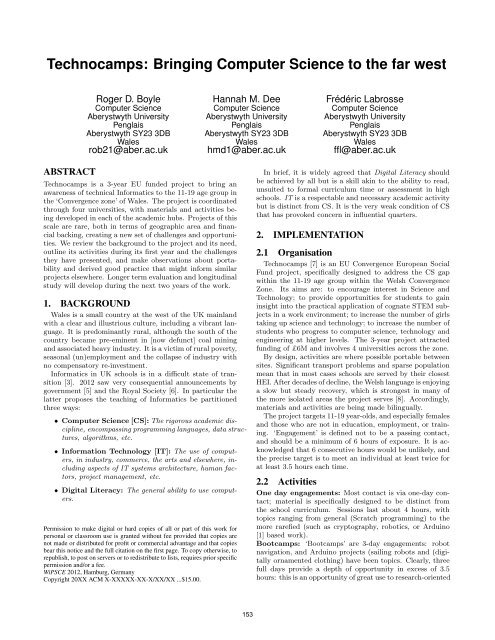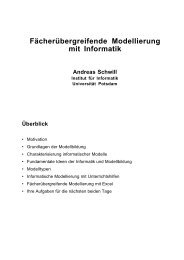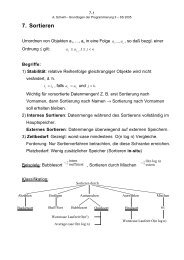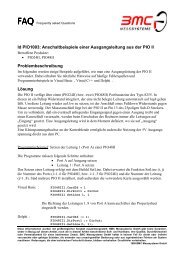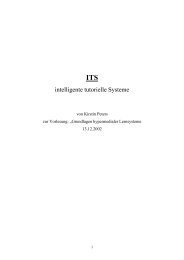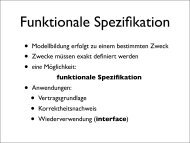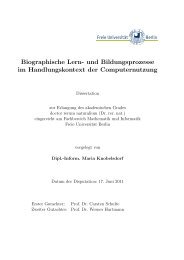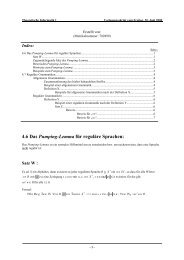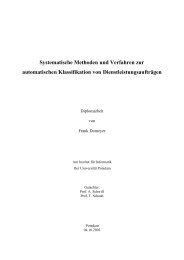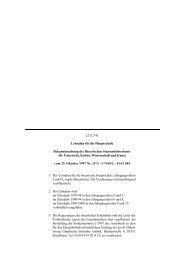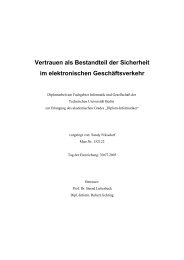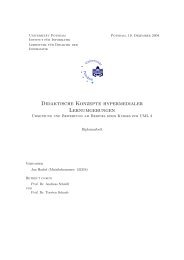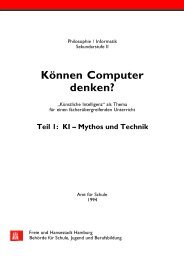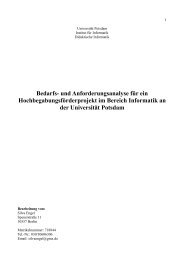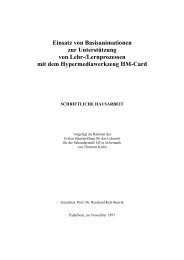Maria Knobelsdorf, University of Dortmund, Germany - Didaktik der ...
Maria Knobelsdorf, University of Dortmund, Germany - Didaktik der ...
Maria Knobelsdorf, University of Dortmund, Germany - Didaktik der ...
You also want an ePaper? Increase the reach of your titles
YUMPU automatically turns print PDFs into web optimized ePapers that Google loves.
Technocamps: Bringing Computer Science to the far west<br />
ABSTRACT<br />
Roger D. Boyle<br />
Computer Science<br />
Aberystwyth <strong>University</strong><br />
Penglais<br />
Aberystwyth SY23 3DB<br />
Wales<br />
rob21@aber.ac.uk<br />
Technocamps is a 3-year EU funded project to bring an<br />
awareness <strong>of</strong> technical Informatics to the 11-19 age group in<br />
the ‘Convergence zone’ <strong>of</strong> Wales. The project is coordinated<br />
through four universities, with materials and activities being<br />
developed in each <strong>of</strong> the academic hubs. Projects <strong>of</strong> this<br />
scale are rare, both in terms <strong>of</strong> geographic area and financial<br />
backing, creating a new set <strong>of</strong> challenges and opportunities.<br />
We review the background to the project and its need,<br />
outline its activities during its first year and the challenges<br />
they have presented, and make observations about portability<br />
and <strong>der</strong>ived good practice that might inform similar<br />
projects elsewhere. Longer term evaluation and longitudinal<br />
study will develop during the next two years <strong>of</strong> the work.<br />
1. BACKGROUND<br />
Wales is a small country at the west <strong>of</strong> the UK mainland<br />
with a clear and illustrious culture, including a vibrant language.<br />
It is predominantly rural, although the south <strong>of</strong> the<br />
country became pre-eminent in [now defunct] coal mining<br />
and associated heavy industry. It is a victim <strong>of</strong> rural poverty,<br />
seasonal (un)employment and the collapse <strong>of</strong> industry with<br />
no compensatory re-investment.<br />
Informatics in UK schools is in a difficult state <strong>of</strong> transition<br />
[3]. 2012 saw very consequential announcements by<br />
government [5] and the Royal Society [6]. In particular the<br />
latter proposes the teaching <strong>of</strong> Informatics be partitioned<br />
three ways:<br />
Hannah M. Dee<br />
Computer Science<br />
Aberystwyth <strong>University</strong><br />
Penglais<br />
Aberystwyth SY23 3DB<br />
Wales<br />
hmd1@aber.ac.uk<br />
• Computer Science [CS]: The rigorous academic discipline,<br />
encompassing programming languages, data structures,<br />
algorithms, etc.<br />
• Information Technology [IT]: The use <strong>of</strong> computers,<br />
in industry, commerce, the arts and elsewhere, including<br />
aspects <strong>of</strong> IT systems architecture, human factors,<br />
project management, etc.<br />
• Digital Literacy: The general ability to use computers.<br />
Permission to make digital or hard copies <strong>of</strong> all or part <strong>of</strong> this work for<br />
personal or classroom use is granted without fee provided that copies are<br />
not made or distributed for pr<strong>of</strong>it or commercial advantage and that copies<br />
bear this notice and the full citation on the first page. To copy otherwise, to<br />
republish, to post on servers or to redistribute to lists, requires prior specific<br />
permission and/or a fee.<br />
WiPSCE 2012, Hamburg, <strong>Germany</strong><br />
Copyright 20XX ACM X-XXXXX-XX-X/XX/XX ...$15.00.<br />
153<br />
Frédéric Labrosse<br />
Computer Science<br />
Aberystwyth <strong>University</strong><br />
Penglais<br />
Aberystwyth SY23 3DB<br />
Wales<br />
ffl@aber.ac.uk<br />
In brief, it is widely agreed that Digital Literacy should<br />
be achieved by all but is a skill akin to the ability to read,<br />
unsuited to formal curriculum time or assessment in high<br />
schools. IT is a respectable and necessary academic activity<br />
but is distinct from CS. It is the very weak condition <strong>of</strong> CS<br />
that has provoked concern in influential quarters.<br />
2. IMPLEMENTATION<br />
2.1 Organisation<br />
Technocamps [7] is an EU Convergence European Social<br />
Fund project, specifically designed to address the CS gap<br />
within the 11-19 age group within the Welsh Convergence<br />
Zone. Its aims are: to encourage interest in Science and<br />
Technology; to provide opportunities for students to gain<br />
insight into the practical application <strong>of</strong> cognate STEM subjects<br />
in a work environment; to increase the number <strong>of</strong> girls<br />
taking up science and technology; to increase the number <strong>of</strong><br />
students who progress to computer science, technology and<br />
engineering at higher levels. The 3-year project attracted<br />
funding <strong>of</strong> £6M and involves 4 universities across the zone.<br />
By design, activities are where possible portable between<br />
sites. Significant transport problems and sparse population<br />
mean that in most cases schools are served by their closest<br />
HEI. After decades <strong>of</strong> decline, the Welsh language is enjoying<br />
a slow but steady recovery, which is strongest in many <strong>of</strong><br />
the more isolated areas the project serves [8]. Accordingly,<br />
materials and activities are being made bilingually.<br />
The project targets 11-19 year-olds, and especially females<br />
and those who are not in education, employment, or training.<br />
‘Engagement’ is defined not to be a passing contact,<br />
and should be a minimum <strong>of</strong> 6 hours <strong>of</strong> exposure. It is acknowledged<br />
that 6 consecutive hours would be unlikely, and<br />
the precise target is to meet an individual at least twice for<br />
at least 3.5 hours each time.<br />
2.2 Activities<br />
One day engagements: Most contact is via one-day contact;<br />
material is specifically designed to be distinct from<br />
the school curriculum. Sessions last about 4 hours, with<br />
topics ranging from general (Scratch programming) to the<br />
more rarefied (such as cryptography, robotics, or Arduino<br />
[1] based work).<br />
Bootcamps: ‘Bootcamps’ are 3-day engagements: robot<br />
navigation, and Arduino projects (sailing robots and (digitally<br />
ornamented clothing) have been topics. Clearly, three<br />
full days provide a depth <strong>of</strong> opportunity in excess <strong>of</strong> 3.5<br />
hours: this is an opportunity <strong>of</strong> great use to research-oriented


